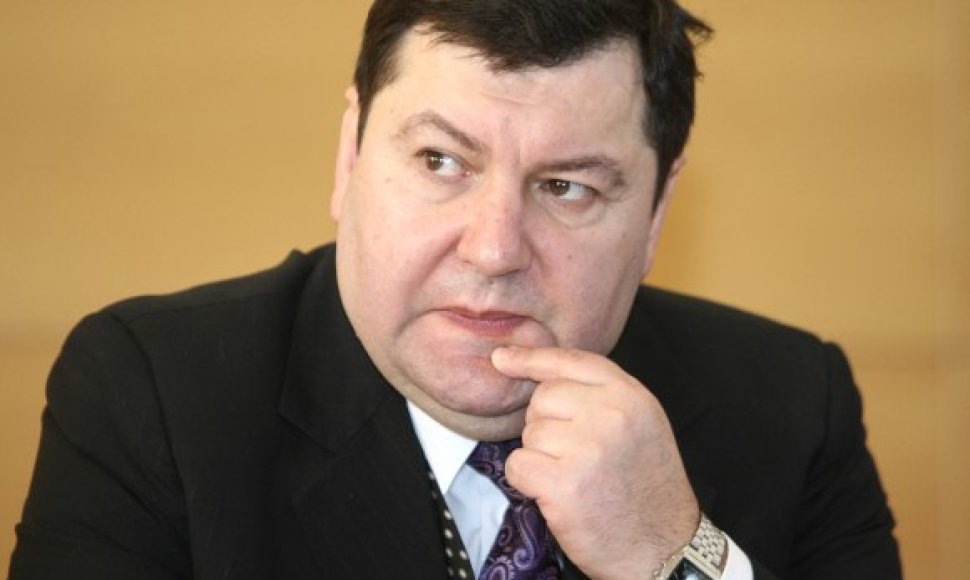- How would you judge Lithuania's progress in preparing for the EU presidency? What has been done and what is still left to be done? Are preparations going according to schedule?
- Getting ready to preside over the Council of the European Union is a complex task, requiring much work and administrative expertise. Thankfully, our diplomats and public servants have so far coped with it well. It has been noted by both Lithuanian and EU institutions. Is everything on schedule? Yes. On 1 February, the Seimas European and Foreign Affairs Committees made a joint declaration, stating that preparation works for the presidency was administered well and going smoothly.
- In August 2008, the Government approved a preparation plan for Lithuania's EU presidency. Is everyone sticking to the plan?
- The 2008 preparation plan is, too, being implemented successfully and consistently. We are currently forming the presidency team, improving administrative skills of the officers to be involved in it, as well as creating logistics management structure to ensure effective event organization both in Lithuania and abroad. To that end, we're not only combining inter-institutional efforts, but also bringing in private sector specialists.
The presidency should not go unnoticed, so we've already started active communication campaign, we're drawing up inner communication schemes. It is crucial that all parties involved in the presidency are well updated and able to pass on information to others.
- Lithuania will inevitably inherit directions and tasks set forth by previous presiding states. To what extent can a presiding country act independently? Is there any room to raise issues that are of national importance to us?
- True, all three partners (Ireland, Lithuania, and Greece) cooperate in setting up the presidency agenda. Besides, the European Commission, the European Council, and the European Parliament also have a say, as every presiding state must take into consideration their long-term policies and priorities.
In spite of that, every presiding nation is in charge of six months of the EU agenda, so there is plenty of opportunity to include issues it finds important. However, I'd like to point out that a presiding state must, first of all, serve as an honest mediator and help arrive at decisions acceptable to all, so solving national problems is not the primary goal of the presidency.
- What are the priorities of the Lithuanian presidency?
- The priorities shall be announced once the 6-month program for Lithuania's presidency over the Council of the European Union is approved, i.e., about 2 to 3 months prior to the start. However, the Lithuanian Parliament named priority guidelines back in November 2011. These include improving energy security, effective implementation of EU strategy regarding the Baltic region, bringing Eastern Neighbourhood countries closer to the EU, effective guarding of external borders.
- What concrete instruments are at the presiding state's disposal to influence EU policies?
- First, there is the above-mentioned 6-month agenda-setting and ability to include its burning issues. Second, the state's competency in providing smooth presidency – its ability to find effective solutions acceptable to all for issues on the agenda.
- What is in it for us? People are proud, they are happy, but it is often difficult to see what we are getting out of it.
- Firstly, the country gets much more attention from European states and beyond, so it is a great opportunity to raise our profile, to make Lithuania's name better known. Experience of other new EU members that took presidency before us – Slovenia, the Czech Republic, Hungary – has demonstrated that during the presidency and afterwards, these countries receive more attention and tourists. It's great chance for businesspeople to present their services and goods. EU presidency provides stimulus for our economy. Around 20-30 thousand delegates visit the presiding country, so the service sector increases its turnover significantly.
Besides, it will be an excellent training ground for Lithuanian public servants and diplomats, it will improve their administrative skills.
- What are the main threats and challenges for Lithuania's presidency?
- Lithuania started preparing for it quite early. Several years after joining the EU, we made a plan that preparations would take place in two stages: first, we would analyze experience of previous presiding states and then we would move on to active arrangements.
In 2006, we started assessing and analyzing experience of other states in order to determine what was needed for a smooth presidency. In 2010, we launched active preparation works. [...] As you can see, from the very beginning, Lithuania approached the preparation for the presidency of the Council of the European Union very seriously, therefore we hope that we will not encounter any serious problems.












